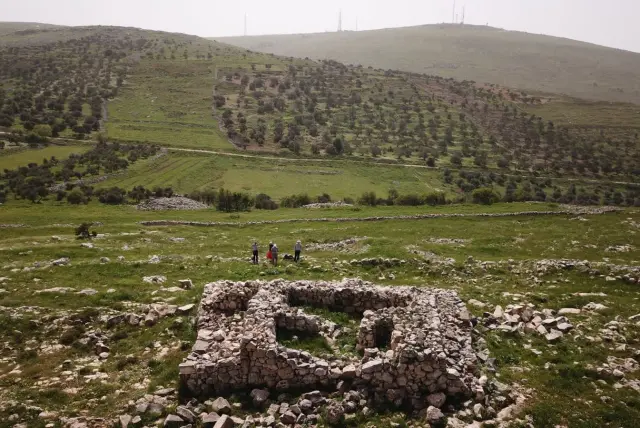In recent times, there has been growing concern about the ongoing damage to the archaeological findings at what is referred to as Joshua’s Altar in the region of Samaria. Addressing this pressing issue, the Knesset, Israel's legislative body, convened a discussion this past Tuesday to delve into the situation and explore measures to protect this historically significant site. Member of Knesset Zvi Sukkot played a pivotal role in this discussion by presenting a photograph of a rare Egyptian scarab discovered on Mount Ebal, underlining the urgency of preserving this valuable historical treasure.
The discussion, focusing on the activities of enforcement agencies in response to the damage incurred at the archaeological site, was organized under the leadership of MK Moshe Solomon, who chairs the subcommittee for Judea and Samaria affairs. In attendance were representatives from the Judea and Samaria Civil Administration, security forces, and various other relevant bodies.
יו"ר ועמ"ש יהודה ושומרון סא"ל (במיל') ח"כ משה סולומון: "קיימתי היום פגישה עם גורמי הצבא ומשרד הביטחון בסוגיית מזבח יהושע והעבודות שהתקיימו בו.
— שיראל ללום נהיר🇮🇱 (@shirellaloom) September 12, 2023
במהלך הפגישה הוצגו בפניי הפעולות שביצעו משרד הביטחון וצה"ל בנושא. חלקם ידועים וחלקם חסויים.
בהתאם לדרישתי יתקיימו הפעולות הבאות: pic.twitter.com/O7Avmx4zbG
During this crucial debate, MK Zvi Sukkot unveiled a photograph showcasing a rare scarab unearthed on Mount Ebal, adjacent to Joshua’s Altar. Researchers have dated this artifact to the 13th century BC, a period corresponding to the reign of Ramesses II, one of the renowned Egyptian kings referred to as Pharaoh in biblical accounts. This discovery has significant implications, as it adds weight to the historical narrative of the Israelite Exodus and their subsequent entry into the land of Israel, a story that has been chronicled in the Bible for generations.
MK Sukkot passionately stated, "We must not underestimate the gravity of the situation. We are engaged in a battle for our history. Joshua’s Altar on Mount Ebal holds immense significance for the Jewish people. It marks the exact spot where the Israelites first set foot upon entering the Promised Land. It stands as the sole archaeological evidence corroborating the Exodus account in the Torah. Just a couple of years ago, the world of science was shaken by the discovery of an amulet artifact at this site, which revolutionized our historical perspective."
He went on to emphasize, "The State of Israel cannot afford to abandon this sacred place, which currently lies neglected. The intentions of the Palestinian Authority, which has ties to terrorism, are crystal clear – they aim to encroach upon Joshua’s Altar by constructing a residential neighborhood nearby, a move that could ultimately lead to its destruction. We must not turn a blind eye to those who threaten the heritage of Israel. This site deserves to be preserved in a manner befitting its historical significance."
Israel must do everything possible to protect Joshua’s Altar from its threatened destruction. The altar is an historic and holy site of deep spiritual significance to Christians and Jews. The altar is featured prominently in our film, “Route 60: The Biblical Highway.” The Oslo…
— David M Friedman (@DavidM_Friedman) September 5, 2023
Joshua’s Altar on Mount Ebal is an archaeological gem that was unearthed and meticulously excavated during the Mount Menashe survey, led by Prof. Adam Zertal. The research team dated the site to the latter part of the 13th century BC. Prof. Zertal's extensive research concluded that this site indeed corresponds to the altar described in the book of Deuteronomy, representing a central element in the blessings and curses associated with the Israelite heritage. As a result, it was christened 'Joshua's Altar' in honor of its biblical significance.
Recent developments have raised concerns regarding the site's preservation. The Palestinian Authority initiated construction of a neighborhood in close proximity to Joshua’s Altar on Mount Ebal, with the apparent intention of isolating and restricting access to the altar. Earlier this month, MK Sukkot personally inspected the situation on the ground. While construction activities have temporarily halted, the planning operation by the Palestinian Authority continues unabated.


